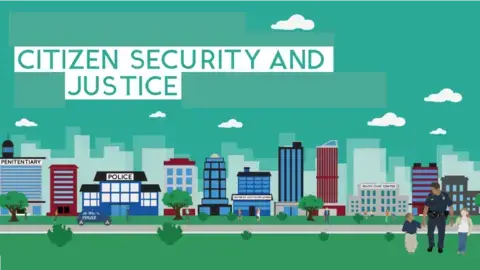Who we are
The Evidence Platform is an initiative led by the Citizen Security and Justice Division of the Institutions for Development Sector of the Inter-American Development Bank (IDB).
Learn more
The creation of the Security and Justice Evidence Platform was possible thanks to the work of a network of IDB specialists and experts from the region and the world.
The initiative was led by Rodrigo Serrano-Berthet, together with a team formed by Alberto Kopittke, Fernando Cafferata, Gonzalo Croci, Rodrigo Pantoja and Sergio Britto Lima.
A long list of people and institutions contributed in many ways to make it a reality, either by helping to conceive the initiative, providing institutional support, financial resources, contributing texts or videos, peer review, quality control, etc.
To all of them, our thanks (in alphabetical order): Adela Sarmiento, Águida Schultz, Alberto Nanzer, Alejandra Casanova, Ana Miraglia, Andreas Hein, Ángela Gaete, Bárbara Caballero, Beatriz Abizanda, Braulio Silva, Bruno Pantaleão, Carlos Mallagaray, Carolina Ricardo, Claudia Pasquetti, Claudio Beato, Daniel Cerqueira, EBFactory, Elena Faba, Erica Machado, Felipe Griebel, Flavia Carbonari, Gastón Pezzuchi, Gonzalo Guzmán, Hernan Flom, Hugo Angel, Hugo Florez, Instituto Cidade Segura, Ivette Rapaport, Joana Monteiro, João Marcelo Borges, José Macedo, Juliana Camargo, Flavia Carbonari, Laura Boeira, Lee Harvey, Macarena Rau, Mauricio Garcia Mejia, Maysa Provedello, Melina Risso, Mildred Rivera, Morgan Doyle, Natália Haubert, Nathalie Alvarado, NFatorial, Norma Peña, Paloma Baytelman, Paula Miraglia, Pedro das Neves, Renato Lima, Roberto de Michele, Romina Nicaretta, Santiago Perez Vincent, Sinapsis, Spencer Chainey, Susana Cordeiro Guerra, Tiago Cordeiro, Tulio Kahn, Vanessa Molina and Wellington Silva.
Special thanks to the institutions whose evidence repositories served as sources of information for the Evidence Bank:Blueprints for Healthy Youth Development, California Evidence-Based Clearinghouse for Child Welfare, Campbell Collaboration, Crime Reduction Toolkit, Crime Solutions, Evidence-Based Policing Matrix e Social Programs that Work.
In general terms, scientific evidence is the result of studies elaborated according to the best scientific methods used in each area of knowledge with the objective of systematizing and analyzing the information in a documented and replicable way.
The Evidence-Based Platform is specifically focused on evidences of effectiveness, a specific type of evidence produced through impact evaluations. This specific research method aims to measure the relationship between a certain type of intervention and its impacts on a certain indicator, seeking to identify whether and to what extent a possible change in this indicator can be attributed to the program, while also trying to rule out, as far as possible, that this change is due to other factors.
The production of scientific evidence spans through multiple dimensions of the security and justice sector, and goes beyond questions related to effectiveness. For example, it can be generated to discern the causes of a problem, such as the risk factors associated with youth homicides; or the impacts of a problem, such as the social, economic and political costs of these homicides.
Scientific evidence is only one of the existing source of information that should be taken under consideration when making decisions on what policies to implement. Other sources of evidence include: the shared values and concerns of communities and parties affected by the programs; the accumulated practical knowledge (expertise) of professionals in the field; or institutional and organizational capacity.
All this information, if well collected, systematized and analyzed, are indispensable to inform the decision-making process. Our main objective with the Security and Justice Evidence-Based Platform is to ensure that scientific evidence can also have "a seat at the table" within decision-making processes. The Platform is designed to offer ideas, inspire, and provide information on different types of solutions and experiences that should be considered when deciding what to do in our cities and countries. In other words, we seek to provide inputs that increase the capacity of decision-makers to think and imagine solutions adapted to the realities and needs of each country.
The Platform does not promote “cookie cutter", one size fit all approach to policymaking. We are aware of the risks of simply acritically copying foreign models and practices that have been applied elsewhere. We know that socio-economic contexts and institutional capacities are important and vary greatly, such that what worked in one place may not work in another.
The use of scientific evidence for public policy decision-making began more intensively in the area of public health, with studies that aimed to evaluate the causes of diseases and the results of certain drugs and vaccines to identify those solutions that really worked and did not cause serious side effects.
This form of decision making process was later expanded to different areas, such as agriculture, social development and education, always seeking to make these public policies more effective and efficient.
In the 1960s and 1970s, this movement made its way into the field of citizen security at the global level, with the use of experimental and quasi-experimental studies targeted at evaluating what works and what does not work in reducing crime and violence.
Since then, the field of empirical criminology or "crime science" has been developing and has increasingly accumulated a significant body of knowledge on what is effective in reducing different types of crime and violence. Thousands of impact evaluations have been accumulated over the past fifty years.
Most of these evaluations are from Anglo-Saxon countries, which were systematized in online repositories available only in English. To change this situation and encourage the production and dissemination of evidence in Latin America and the Caribbean, the IDB decided to create this digital platform to disseminate evidence on citizen security and justice in the region.
The main objective of the Platform is to facilitate the access of decision makers in Latin America and the Caribbean to the best available scientific evidence on the effectiveness of existing citizen security and justice solutions.
In addition, we hope to provide a forum to strengthen a regional community of practice committed to the generation and application of existing evidences in the fields of citizen security and justice in the region.

